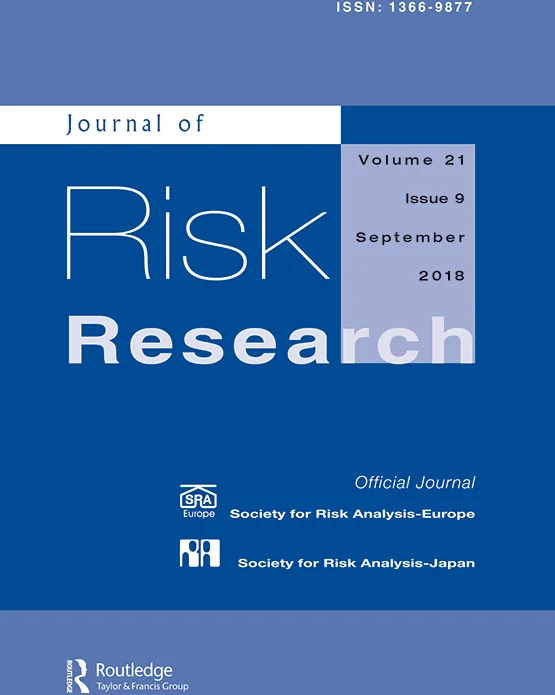Utilizing MRBQ to investigate risky rider behavior in Chinese young riders: combining the effect of Big Five personality and sensation seeking
IF 1.7
4区 管理学
Q1 SOCIAL SCIENCES, INTERDISCIPLINARY
引用次数: 0
Abstract
AbstractThe motorcycle rider behavior questionnaire (MRBQ) is one of the most extensively used questionnaires to explore risky rider behavior worldwide. However, whether previous research adopted other scales or other versions of MRBQ, neither of them fully cover the typicality of the risky behavior in Chinese motorcyclists. Moreover, past research investigated the MRBQ while combining the joint effect of Big Five personality (BFP) and sensation seeking lacks. Our study aims to revise the Chinese version of MRBQ in young riders and explore the relationship among BFP, sensation seeking, MRBQ, and self-reported traffic violations. 278 online participants filled out the Big Five Inventory measuring BFP, the sensation seeking scale, MRBQ items selected from previous versions in other countries, and self-reported traffic violations from the traffic management system (crashes, traffic violation frequency, penalty points, and fines). Exploratory factor analysis suggested 7 factors (safety equipment, traffic errors, speed violations, control errors, stunts, traffic violations, and safety violations), and the internal consistency reliability ranged from 0.58–0.91. The hierarchical linear regression analysis showed that agreeableness and conscientiousness in BFP negatively predicted the total MRBQ score, while openness in BFP and sensation seeking positively predicted the total MRBQ score. In addition, the Poisson regression analysis suggested that all kinds of self-reported traffic violations could be positively predicted by the total MRBQ score. Path analysis suggested the fully mediating role of sensation seeking. In conclusion, the Chinese version of the MRBQ is useful for future studies and the sensation seeking plays a mediating role between the Big Five personality and MRBQ.Keywords: Safety of motorcyclistsmotorcycle rider behavior questionnairebig five personalitysensation seekingmediation model Disclosure statementNo potential conflict of interest was reported by the author(s)Consent to participateInformed consent was obtained from all individual participants included in the study.Data availability statementPlease email the corresponding author for raw data and materials.Additional informationFundingThis study was supported by the National Natural Science Foundation of China under Grants No. 32071064, 32071066, 32271132, 31771225, 71971073.运用MRBQ研究中国青年骑手的冒险骑行行为:结合大五人格和感觉寻求的影响
摘要摩托车骑手行为问卷(MRBQ)是世界范围内应用最广泛的摩托车骑手危险行为调查问卷之一。然而,以往的研究是否采用其他量表或其他版本的MRBQ,都没有完全覆盖中国摩托车手危险行为的典型性。此外,以往的研究还缺乏将大五人格(BFP)与感觉寻求的共同作用结合起来考察MRBQ的研究。本研究旨在修订中国年轻车手的MRBQ,并探讨BFP、感觉寻求、MRBQ和自述交通违规之间的关系。278名在线参与者填写了衡量BFP的五大量表、感觉寻求量表、从其他国家以前的版本中选择的MRBQ项目,以及交通管理系统中自我报告的交通违规行为(撞车、交通违规频率、罚分和罚款)。探索性因子分析得出7个因素(安全设备、交通错误、速度违规、控制错误、特技、交通违规、安全违规),内部一致性信度范围为0.58 ~ 0.91。层次线性回归分析显示,友善性和尽责性对MRBQ总分有负向预测,开放性和感觉寻求性对MRBQ总分有正向预测。此外,泊松回归分析表明,MRBQ总分对自述的各类交通违法行为均有正向预测作用。通径分析表明,感觉寻求具有充分的中介作用。综上所述,中文版本的MRBQ对未来的研究是有用的,感觉寻求在大五人格和MRBQ之间起中介作用。关键词:摩托车手安全摩托车手行为问卷大五人格感觉寻求中介模型披露声明作者未报告潜在利益冲突同意参与研究的所有参与者均获得知情同意。数据可用性声明原始数据和材料请发电子邮件给通讯作者。基金资助:国家自然科学基金项目(32071064、32071066、32271132、31771225、71971073)。
本文章由计算机程序翻译,如有差异,请以英文原文为准。
求助全文
约1分钟内获得全文
求助全文
来源期刊

Journal of Risk Research
SOCIAL SCIENCES, INTERDISCIPLINARY-
CiteScore
12.20
自引率
5.90%
发文量
44
期刊介绍:
The Journal of Risk Research is an international journal that publishes peer-reviewed theoretical and empirical research articles within the risk field from the areas of social, physical and health sciences and engineering, as well as articles related to decision making, regulation and policy issues in all disciplines. Articles will be published in English. The main aims of the Journal of Risk Research are to stimulate intellectual debate, to promote better risk management practices and to contribute to the development of risk management methodologies. Journal of Risk Research is the official journal of the Society for Risk Analysis Europe and the Society for Risk Analysis Japan.
 求助内容:
求助内容: 应助结果提醒方式:
应助结果提醒方式:


